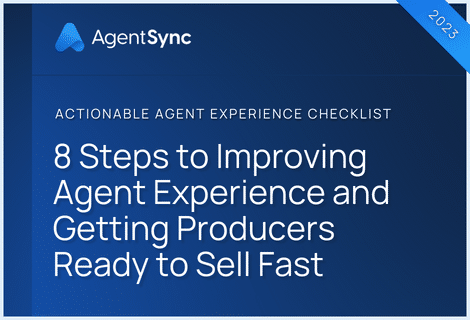

When other industry professionals asked me to name three words that best described my experience working in the insurance industry, I chose “challenging,” “evolving,” and “essential.”
I probably don’t need to explain my choice of the word “challenging.” All of us in the industry, from the newest recruits to the old-timers, are more than aware of the challenges we face. From passing your first licensing exam to helping insureds through some of the roughest times in their lives, it can be challenging at times. Not to mention, in my role specifically, the ongoing challenge of managing agent contracting and licensing compliance, in a constantly changing landscape.
I also suspect we can all agree the industry is evolving. For some, it may be too fast – while for others, not fast enough. But the evolution is visible when you look back at the way insurance businesses (both carriers and agencies) operated as recently as 2019 versus today. Also evolving are the products and services the industry provides. Who would have imagined back in the 1980s that something like “cyber liability” insurance would even exist? And the evolution from recovering from losses to preventing losses is happening in every corner of the industry.
That brings me to “essential.” Of course, insurance is an essential part of the global economy. The products themselves are essential to everything from personal car and home ownership to the functioning of the world’s largest mega-corporations.
But what about the essence of what’s essential to our own roles in the industry? What are the mandatory ingredients that insurance professionals must have when they’re the humans powering such a pivotal piece of literally every business, and most individuals, in America?
Thinking about this question, I concluded that there are three essential ingredients all insurance professionals have to include in their recipe for success.
1. It’s essential to serve clients diligently
Diligence is defined as careful and persistent work. But is it enough for an insurance professional to diligently pursue the quickest possible outcomes and solutions? In my opinion, no.
We must all apply the ingredient of diligence to our service of clients and their needs. What does that mean, specifically?
- We must be relentless in our pursuit of excellence in the service of our clients; ensuring we’re doing everything in our power to give them the very best, each and every time.
- We must connect with those we serve by understanding their pain points, hearing their needs, and listening to their stories.
- We must understand and acknowledge that needs change regularly, based on circumstances, and we must always be ready and willing to adapt to such changes so we continue to provide the best for our clients regardless of what’s happening around them.
It’s only through diligence in our service to clients that we become true partners and trusted confidants who can walk alongside them in their journeys.
2. It’s essential to adapt and evolve
As I mentioned before, the industry is constantly evolving. Like most evolutions throughout history, those who refuse to adapt will eventually go extinct. Our industry is famous for clinging to the mindset that it’s safer to “do things the way we’ve always done them,” or “if it isn’t broken, don’t fix it.”
My motto is the opposite: If it isn’t broken, break it!
Just because something has always been done a specific way doesn’t necessarily mean it’s the best or most efficient way. We have to be willing to step out of the comfortable and into the possible. We have to be willing to dream, innovate, take risks, and evolve, as we continue to strive toward the very best.
As we continue to serve our clients diligently, we know things are going to change, and we must be prepared. Client situations change, technology changes, regulations and processes change and, in our pursuit of serving our clients diligently, we have to be ready to adapt and evolve as needed. Our teams deserve it, our industry deserves it, and, most importantly, our clients deserve it.
3. It’s essential to pursue new methods and technologies
Like a secret family recipe, you can’t just take the first couple of ingredients and call it good. It only works when you combine all of the essential ingredients together. So, on top of diligently serving clients with excellence at all times, combined with a willingness to adapt and evolve, we must now add in the pursuit of new methods and technologies.
The world seems to be moving faster than the speed of light, and those that pause too long will be unable to catch up with those who forged ahead.
When you look around at the options, with new tech coming to the market every day, it can be intimidating and overwhelming. Faced with the thought of new technologies, a lot of us get stuck in “analysis paralysis” because we don’t even know where to begin or how to determine what’s really essential and what’s just icing on the cake. This is a real problem, and one that can keep insurance professionals from being able to take their capabilities to a whole new level.
The danger is that, while you’re weighing all the options and debating the pros and cons of integrating new systems, methods, and technology into your process, others are already doing it. The world seems to be moving faster than the speed of light, and those that pause too long will be unable to catch up with those who forged ahead.
Since technology is such an essential ingredient for success in this industry, it’s vital that each of us knows how to:
- Identify the challenges we have that new methods and tech can solve.
- Understand how to evaluate our options and weigh all potential solutions.
- Expertly convey the necessity of new methods and technologies to the larger business, if we need buy-in from others before we can move forward.
- Choose methods and tech solutions that share our beliefs when it comes to the essential nature of serving clients and continuous improvement.
I know all of this is easier said than done. No one ever promised success in the insurance industry would be easy. Nonetheless, we have to focus on these ingredients, even if they’re difficult, if we want to remain the essential industry we’ve historically proven to be, for centuries to come.

